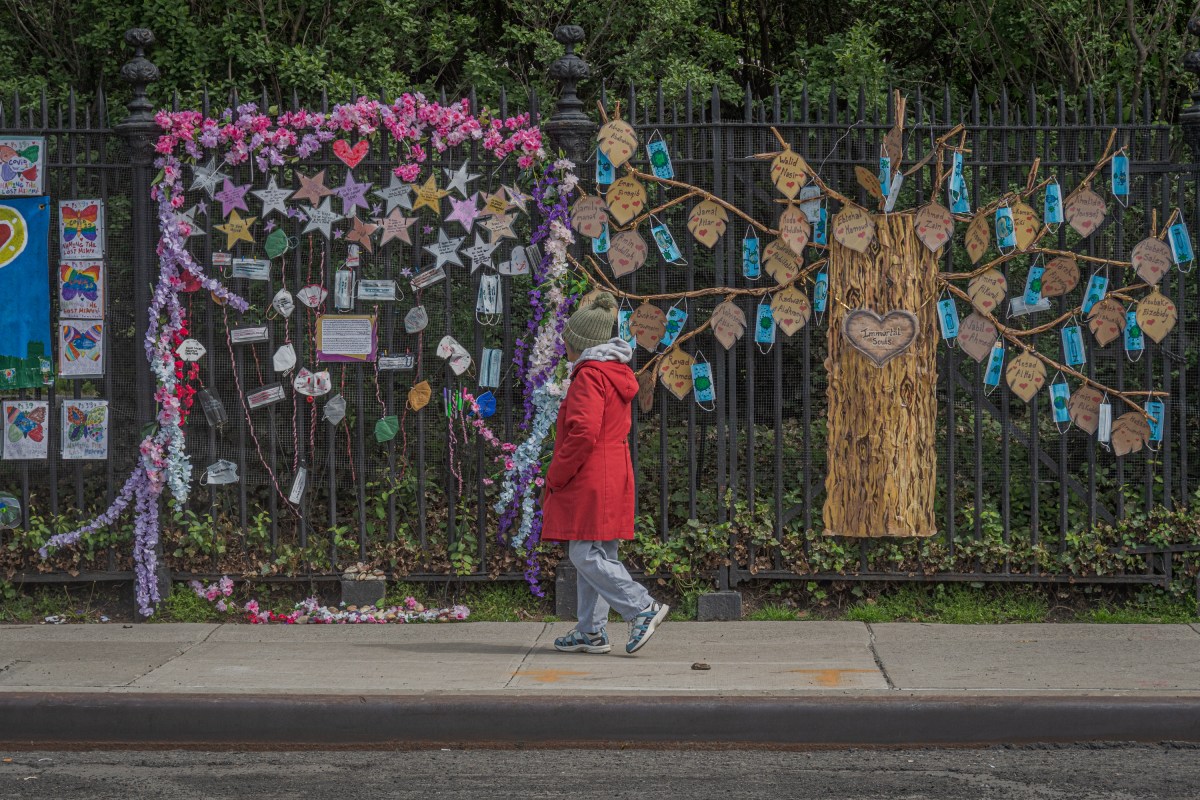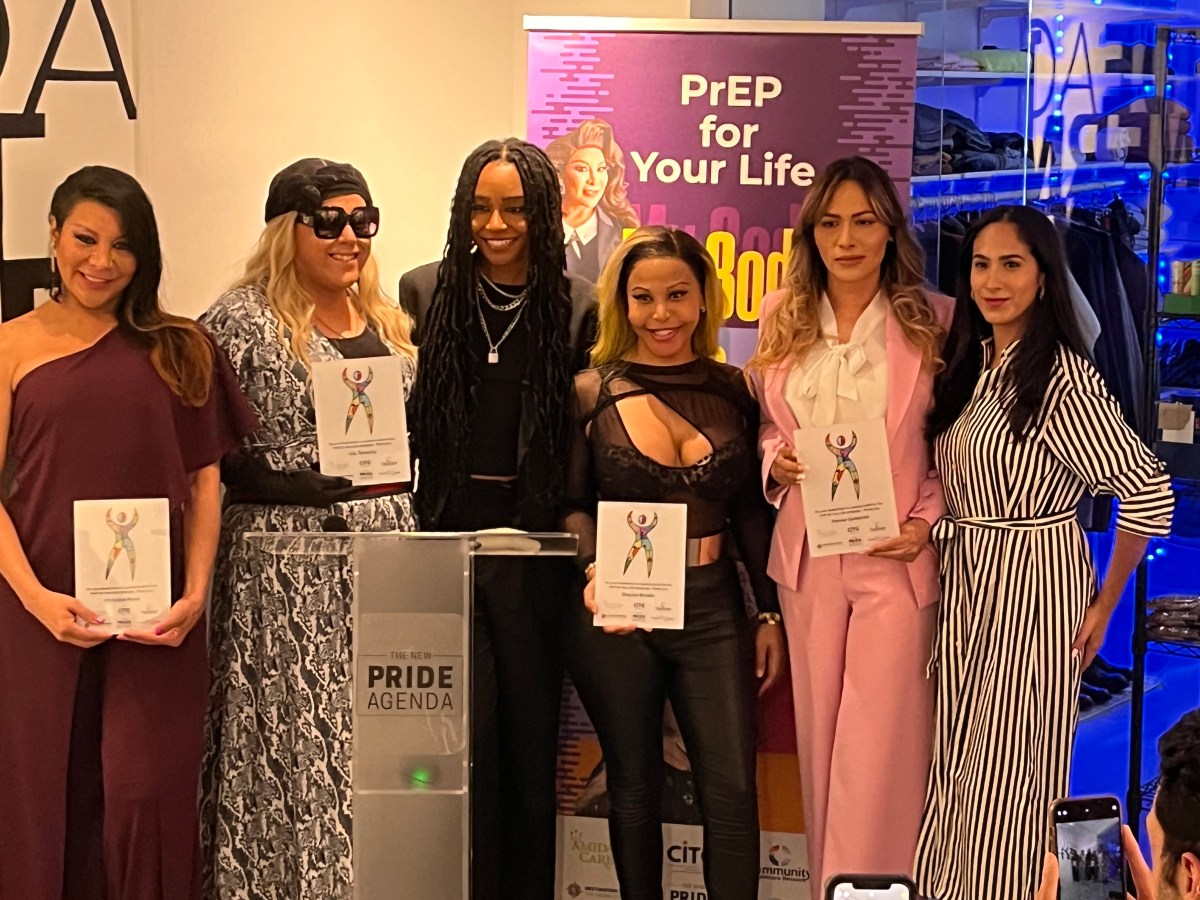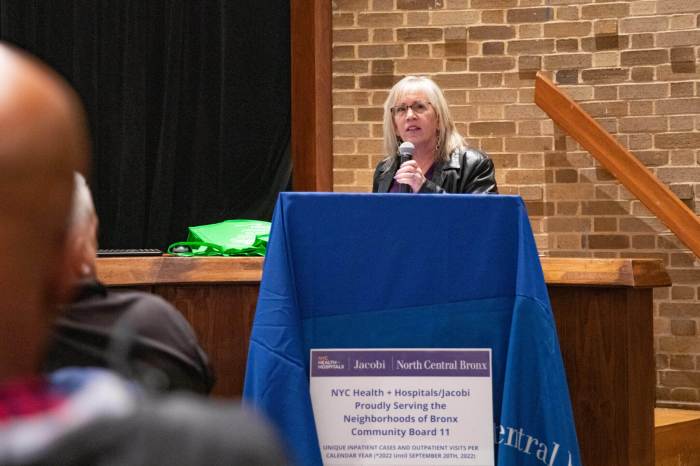
BY MICHAEL LYDON | On a grey and snowy Tuesday morning in the East Village, a trickle of seniors citizens, bundled up in puffy winter coats, hats pulled over their ears, scarves wrapped around their necks and instrument cases large and small in their gloved hands, made their way to the Third Street Music School (actually on 11th Street, near Second Avenue), stomped the slush off their boots on the door mat then made two left turns into the school’s brightly lit auditorium.
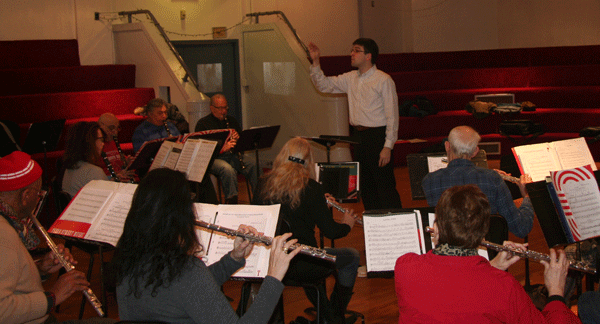
Brandon Tesh, standing, directs the New Horizons band.
Waving hello to friends already there, they doffed their wooly outerwear, sat down in the forest of music stands and got out their instruments, joking and gossiping as they inserted their mouthpieces and blew a few trial bleats and blaats. Then Brandon Tesh, the neat and youthful musical director, tapped gently but firmly on his stand with his baton.
“Good morning, everyone!” said Tesh. “We’ve got a lot of work to do, so let’s warm up your breath first. We’ll breathe in for four beats, hold for four beats, then out for four beats. Ready? Let’s open up our lungs!” Tesh’s manner was informal and friendly, and with his jet-black hair he could have been the grandson of many of his players — but all the seniors instantly knew that chat time was over and work time had begun.
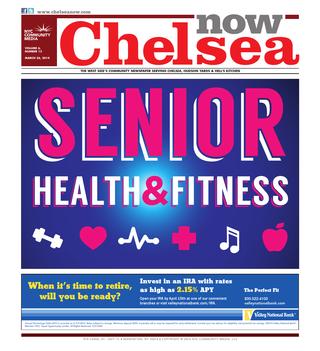
This wintry Tuesday was a gathering of Third Street’s New Horizons Band — a program founded in 1991 at Rochester’s Eastman School of Music to bring seniors, who had played an instrument as kids, back to music. Local New Horizons groups, like Third Street’s, create their own program to suit their neighborhood and needs. Some are for seniors only, some are for adults of all ages — but all can get band arrangements both simple and sophisticated, as well as guidance and a sense of community, from the New Horizons International Music Association: newhorizonsmusic.org.
“Many adults have had music teachers who told them, ‘Move your lips in chorus, but don’t make a sound,’ ” declares a New Horizons mission statement, “but we believe every person has musical potential that can become personally rewarding. New Horizons programs are for adults who haven’t played for years, even for those who have no musical experience.”
Third Street offers interested seniors three New Horizons bands: a Beginner’s Group that meets Tuesday evenings at the School, an Advanced Beginner’s Group that meets Monday and Wednesday mornings at Hamilton-Madison House (50 Madison Avenue) and the Advanced Big Band that meets Tuesday and Thursday mornings. At every level, band membership gives seniors challenging mental activity, the mission statement goes on, a group of like-minded friends and a way to experience and express “serious thoughts and joyful moments.” One New Horizons member put the benefits in practical terms: “Being old, retired and widowed, I joined the band to have something to do. Now I don’t know what I’d do without it.”
“Okay,” said Tesh after the seniors had huffed and puffed through the breathing exercises, “Now let’s see if we are in tune. Everybody play a nice strong A. One, two, three, go!” A mighty but muddy boom of sound arose from the nine flutes, three saxophones, three clarinets, three trumpets, two trombones, two tubas, two bassoons and one French horn. Tesh winced. “We can do better than that. Big breath this time, and make that tone good and strong. Go!” This time the huge boom had a crisp and satisfying clarity, and Tesh grinned widely. “That’s more like it!”
For the next fifteen minutes, as the orchestra played long legato tones, short staccato tones, high tones and low tones, Tesh keeping up a flow of helpful suggestions: “Sit up straighter…bigger breath…keep your tone strong all the way to the end.” He focused first on each instrumental section, asking the others to sit silent, then he brought the whole orchestra back together to play a monster chord, the tubas plunging to the depths, the bassoons and trombones rumbling just above them, then the saxes, clarinets, flutes and trumpets climbing in ascending order to the very top of their ranges. The walls of the auditorium vibrated with the band’s tuneful roar. “Yeah!” said Tesh. “Now we’re ready to play some music! Please open your books to Chorale #5.”
From shoulder bags slumped on the floor beside them, the players — half-and-half men and women, and every color of the American rainbow — pulled out their bold red and white Third Street folders and arranged their sheet music on their stands. The first run-through of the chorale ended weakly. “Oh, listen to that,” Tesh cried with mock annoyance. “You must give your closing notes full value, even when we slow down for the last few measures. Look, let’s sing the ending.” He counted off, and the players hummed the notes they had been playing. “Lovely,” said Tesh, “now let’s play it from the top.”
This time, as if by magic, the harmony of the ensemble had become sweet and clear. First the saxes carried the melody, the flutes flying above, then the trumpets took over — and through their darting counterpoint came the bell-like tinkle of percussionist Linda Brown’s glockenspiel. “Here comes the crescendo!” called Tesh, and his orchestra responded with a sudden blaring push. “No, no,” said Tesh, waving his baton until the players stopped. “We’ve got to reach the climax little by little, poco a poco, as it says on your scores.”
“Easy for you to say,” the French horn player muttered to the trombonist beside him. The players sitting nearby chuckled. Tesh wisely acted as if he hadn’t heard, but announced it was time to take five, and the players got up, stretched, sipped from their water bottles and chatted with this visiting reporter.
“Oh, I love being in this band,” said tenor sax player Neal King, as he adjusted his horn’s reed. “Joined five years ago, had never played an instrument in my life, and would have bet I’d never learn to read music, but here I am! I had to retire as a firefighter because of lung damage, but my wife said this could be good for me, and you know what? My lung scans keep getting better. All the breathing helps.”
“I played clarinet in high school,” said bass clarinetist Judy Bosco, “but until I heard about the New Horizons band, I hadn’t played for years. What I love is: we’re all trying to improve, but there’s no pressure. It’s music for the fun of it.” Pam Pier, who owns the Dinosaur Hill toyshop on East Ninth agreed. “My flute had been in the closet for decades,” she said, “but when someone told me about a senior band that met only two blocks away, I said, ‘That’s for me!’ Like the toy shop, music keeps me young.”
Tesh tapped his stand again; time to get back to work. All the warm up exercises now paid off, and the band romped through a half dozen tunes, including the lyrical “Air for Band,” a stomping blues, “Basin Street Barbeque” and the mellow “Samba for Flutes.” The samba had some tricky Brazilian syncopations, but backed up by Linda Brown’s steady beat on snare drum and cymbal, the ensemble kept up a sexy, swaying groove, the flutes leading the way through the playful melody, the two tubas poot-pooting down in the sub-basement.
When the bells of St. Mark’s church rang noon, it was time to stop for the day. “That was a good session, everybody,” said Tesh, then asked for comments and questions. “What do we do if we screw up in a concert like we do when we practice?” someone called out. “Oh, don’t worry about it,” replied Tesh with a grin, “audiences are always kind.”
“You know, Brandon, you’re always telling us to count out the tempo,” said one trombonist, “but really we keep on time by watching your body language.”
“That’s fine,” said Tesh, then asking a question he’d asked many times before: “What’s the most important thing about tempo?”
“Don’t slow down!” the orchestra answered in unison.
“And who’s responsible for keeping a steady tempo?”
“Everybody!” said everybody.
Billy Lyles, a gray-haired flutist, raised his hand.
“Yes, Billy?” said Tesh.
“Even more important than tempo,” said Billy, “is for us to say a big ‘Thank you’ for all you’ve given us.” The whole orchestra clapped and cheered. Tesh blushed, and the orchestra, chuckling, began putting their instruments back into their cases, pulling their scarves and hats out of their coat sleeves, then headed back out into the cold.
— For more information, visit thirdstreetmusicschool.org, call 212-777-3240 or stop by 235 East 11th Street and pick up a brochure.










